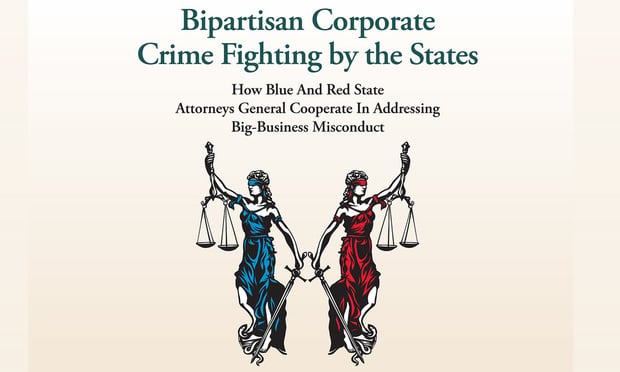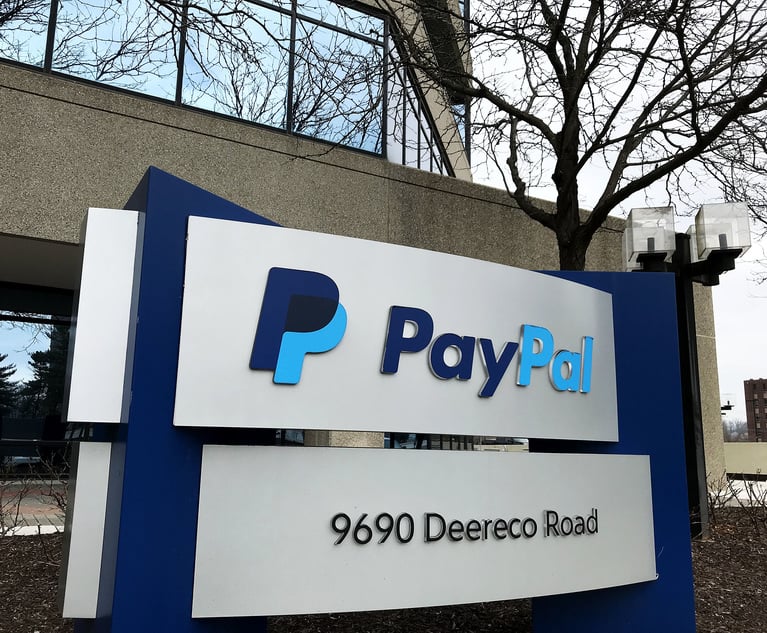Companies Have Paid Over $105B in State Attorney General Joint Lawsuits Since 2000
The report, "Bipartisan Corporate Crime Fighting by the States," by the D.C. nonprofit group Good Jobs First is a compilation of multistage lawsuits filed by attorneys general of the 50 states and the District of Columbia.
September 19, 2019 at 05:29 PM
4 minute read
The original version of this story was published on Corporate Counsel
 Bipartisan Corporate Crime Fighting by the States (courtesy photo)
Bipartisan Corporate Crime Fighting by the States (courtesy photo)
Bank of America Corp. and CVS Health Corp. are cited as two of the top defendants in joint lawsuits brought by state attorneys general since 2000, according to a new study that shows corporations have paid over $105 billion in penalties.
The report, "Bipartisan Corporate Crime Fighting by the States," is a compilation of multistage lawsuits filed by attorneys general of the 50 states and the District of Columbia. It was published this week by the nonprofit group Good Jobs First, based in Washington, D.C.
It is believed to be the first compilation of such data since attorneys general became more active litigators beginning with the huge tobacco settlements in the late 1990s. The study does not include the most recent mega-suits involving opioid drug companies such as Purdue Pharma and big technology companies such as Google and Facebook, which are still pending.
The data show there have been 644 joint suits, primarily against Fortune 500 companies over alleged misconduct. In 243 of the multistate cases, the U.S. Department of Justice or another federal agency was also involved in the settlement and often led the negotiations.
BofA paid the most in cumulative penalties, totaling $26 billion, while CVS was the most frequent defendant with 14 different settlements totaling $215 million.
William Halldin, a spokesman for Charlotte, North Carolina-based BofA, told Corporate Counsel on Thursday, "There's nothing new in the report, which simply highlights the well-known fact that we made substantial payments to resolve mortgage-related issues largely stemming from Countrywide and other acquisitions."
Rhode Island-based CVS Health did not immediately respond to messages seeking comment.
Philip Mattera, co-author of the report and director of research for Good Jobs First, said he was surprised by the number of bipartisan, multistate cases. "It shows quite a significant history of states working together, especially in a bipartisan way."
Even while some Republican states attacked Obamacare or Democratic states attacked President Donald Trump's immigration policies, they still cooperated on suits against corporate misconduct, Mattera noted.
The data are just part of a massive corporate criminal and civil violation database being compiled by the group. It's called Violation Tracker and is available to the public.
Mattera said the goal was to create a comprehensive resource on corporate misconduct for lawyers, journalists, public officials and others who want to hold companies accountable.
He said corporations also use the database to check up on their competitors, and in-house counsel use it as part of due diligence during mergers and acquisitions.
Neither the report nor Violation Tracker makes any recommendations or editorializes in any way. "We want the database to be neutral," Mattera explained. "Just the facts."
The report states, "There is every reason to believe that the number of multistate AG settlements will continue to grow." So will the group's database, Mattera said, which is expanding to include class action lawsuits and state agency enforcement actions.
Funding for the study came from the Reva and David Logan Foundation.
Here are some other findings from the report:
- The research team found 7,600 applicable cases brought by state attorneys general, but focused on the ones brought jointly by more than one state.
- The states that most often take the lead position in these suits are New York and California.
- In at least 260 cases, a majority of the states signed on as plaintiffs. In 172 cases, 40 or more states participated.
- Because of the 2008 financial crisis and its aftermath, the banking industry led the way as the most penalized offenders. BofAa's $26 billion in penalties was followed by the Swiss bank UBS at $11 billion, Citigroup Inc. at $8 billion, JPMorgan Chase & Co. at $6 billion. Then comes a nonbank company, BP, at $4.9 billion.
This content has been archived. It is available through our partners, LexisNexis® and Bloomberg Law.
To view this content, please continue to their sites.
Not a Lexis Subscriber?
Subscribe Now
Not a Bloomberg Law Subscriber?
Subscribe Now
NOT FOR REPRINT
© 2025 ALM Global, LLC, All Rights Reserved. Request academic re-use from www.copyright.com. All other uses, submit a request to [email protected]. For more information visit Asset & Logo Licensing.
You Might Like
View All
CFPB Alleges Berkshire Hathaway Subsidiary Originated Unaffordable Housing Loans

Class Certification, Cash-Sweep Cases Among Securities Litigation Trends to Watch in 2025
6 minute read
'Biggest Influencer Scam of All Time'?: PayPal Accused of Poaching Commissions Via Its 'Honey' Browser Extension

Trending Stories
- 1The FTC’s Noncompete Rule Is Likely Dead
- 2COVID-19 Vaccine Suit Against United Airlines Hangs on Right-to-Sue Letter Date
- 3People in the News—Jan. 10, 2025—Lamb McErlane, Saxton & Stump
- 4How I Made Partner: 'Be Open With Partners About Your Strengths,' Says Ha Jin Lee of Sullivan & Cromwell
- 5Essential Labor Shifts: Navigating Noncompetes, Workplace Politics and the AI Revolution
Who Got The Work
Michael G. Bongiorno, Andrew Scott Dulberg and Elizabeth E. Driscoll from Wilmer Cutler Pickering Hale and Dorr have stepped in to represent Symbotic Inc., an A.I.-enabled technology platform that focuses on increasing supply chain efficiency, and other defendants in a pending shareholder derivative lawsuit. The case, filed Oct. 2 in Massachusetts District Court by the Brown Law Firm on behalf of Stephen Austen, accuses certain officers and directors of misleading investors in regard to Symbotic's potential for margin growth by failing to disclose that the company was not equipped to timely deploy its systems or manage expenses through project delays. The case, assigned to U.S. District Judge Nathaniel M. Gorton, is 1:24-cv-12522, Austen v. Cohen et al.
Who Got The Work
Edmund Polubinski and Marie Killmond of Davis Polk & Wardwell have entered appearances for data platform software development company MongoDB and other defendants in a pending shareholder derivative lawsuit. The action, filed Oct. 7 in New York Southern District Court by the Brown Law Firm, accuses the company's directors and/or officers of falsely expressing confidence in the company’s restructuring of its sales incentive plan and downplaying the severity of decreases in its upfront commitments. The case is 1:24-cv-07594, Roy v. Ittycheria et al.
Who Got The Work
Amy O. Bruchs and Kurt F. Ellison of Michael Best & Friedrich have entered appearances for Epic Systems Corp. in a pending employment discrimination lawsuit. The suit was filed Sept. 7 in Wisconsin Western District Court by Levine Eisberner LLC and Siri & Glimstad on behalf of a project manager who claims that he was wrongfully terminated after applying for a religious exemption to the defendant's COVID-19 vaccine mandate. The case, assigned to U.S. Magistrate Judge Anita Marie Boor, is 3:24-cv-00630, Secker, Nathan v. Epic Systems Corporation.
Who Got The Work
David X. Sullivan, Thomas J. Finn and Gregory A. Hall from McCarter & English have entered appearances for Sunrun Installation Services in a pending civil rights lawsuit. The complaint was filed Sept. 4 in Connecticut District Court by attorney Robert M. Berke on behalf of former employee George Edward Steins, who was arrested and charged with employing an unregistered home improvement salesperson. The complaint alleges that had Sunrun informed the Connecticut Department of Consumer Protection that the plaintiff's employment had ended in 2017 and that he no longer held Sunrun's home improvement contractor license, he would not have been hit with charges, which were dismissed in May 2024. The case, assigned to U.S. District Judge Jeffrey A. Meyer, is 3:24-cv-01423, Steins v. Sunrun, Inc. et al.
Who Got The Work
Greenberg Traurig shareholder Joshua L. Raskin has entered an appearance for boohoo.com UK Ltd. in a pending patent infringement lawsuit. The suit, filed Sept. 3 in Texas Eastern District Court by Rozier Hardt McDonough on behalf of Alto Dynamics, asserts five patents related to an online shopping platform. The case, assigned to U.S. District Judge Rodney Gilstrap, is 2:24-cv-00719, Alto Dynamics, LLC v. boohoo.com UK Limited.
Featured Firms
Law Offices of Gary Martin Hays & Associates, P.C.
(470) 294-1674
Law Offices of Mark E. Salomone
(857) 444-6468
Smith & Hassler
(713) 739-1250








